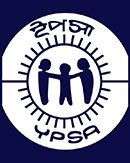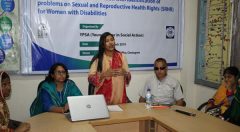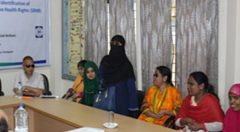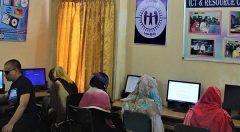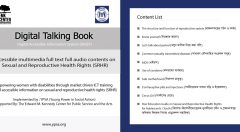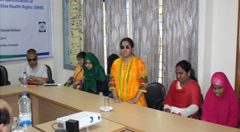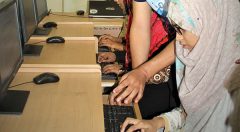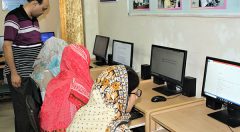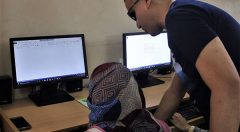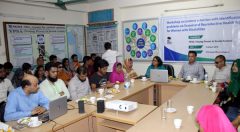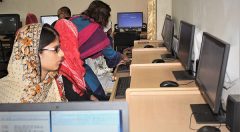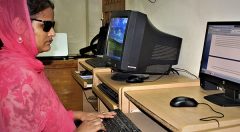Photo Gallery
Project Title:
Empowering women with disabilities through market driven ICT training and accessible information on sexual and reproductive health rights (SRHR).
Implementing Organization: Young Power in Social Action (YPSA)
Country: Bangladesh
Region: Chattogram
Project Status: Ongoing
Starting Date: 05/02/2019
Expected Completion Date: 31/07/2019
Beneficiaries: Women with Disabilities.
Supported By: The Edward M. Kennedy Center for Public Service and the Arts
Overview of the plan:
Approximately 300 million women around the world have mental and physical disabilities. Globally, women make up three-quarters of the disabled people in low and middle income countries. In Bangladesh, every 1 in 10 women experience at least one kind of disability. These disabled women are the poorest of the poor because discrimination cuts off their escape routes from poverty and also other facilities, such as, education, health, equal pay, employment, access to land and finance are frequently inaccessible to them, thus being subordinated, exploited and oppressed in various ways by the society. Discrimination deprives them from all mainstream development initiatives. Consequently, illiteracy and unemployment are very high among them which, on the one hand, limit their options in life, and on the other hand, increase their dependency on others. Yet, there have not been any significant initiatives taken to mainstream these physically challenged population.
In spite of their physical inabilities these women are differently capable of significant contribution to the economy, therefore, it is economically unacceptable because of the waste of human resources that it entails; it is humanly unacceptable since it prevents a significant portion of the population from taking part in building the world; it is intellectually unacceptable as it deprives contribution of ideas and knowledge, in a word, of creativity. Nevertheless, with some basic skills on the use of new technologies, especially Information and communication technologies (ICTs), they can easily prove their productivity and become mainstreamed in the job market.
On the other hand, Comprehensive education and information on sexual and reproductive health is the critical element of sexual and reproductive health rights (SRHR). Women with disabilities themselves consider information on sexual and reproductive health not just as a need, but as their right, including the right to information on contraception and to make choices on what method to use, and the right to be free from sexual violence. Despite being a right, women with disabilities often do not have equal access to information and education related to sexual and reproductive health, sexuality, and relationship, thus hampering their ability to make informed decisions about these issues.
So this project targets to empower women with disabilities by providing them with specific result focused, market driven ICT training along with facilitation for job placement, and also adequate accessible informative materials on sexual and reproductive health right (SRHR), and thus prepare them for a satisfactory personal and professional life.
Goals, Objectives and rationale:
Women with disabilities often face difficulty transitioning to work, as they lack necessary skills to perform efficiently in the job market and also face discrimination from employers because of their gender and impairments. Women with Disabilities in Bangladesh lack the necessary skills to perform competitively in the job market and face discrimination from employers on the basis of their disability. This project will provide scope for acquiring certain ICT skills for women with Disabilities living in chattogram to compete in the job market.
Although, there have been some scattered initiatives by government and non-government organizations that barely address the issue through providing some charity services such as vocational training etc. But this project is emphasizing on women with disabilities, which is very much unique than others initiatives. Furthermore, women with disabilities are kept in the dark about their sexual and reproductive health rights (SRHR) and often don’t know how to protect themselves against abuse, pregnancy and diseases.
This project will improve the quality of their lives, enhance their dignity as individuals and work their way out of poverty, unemployment and ignorance by providing them with ICT based professional capacity to exercise equal employment and business opportunities by using their ICT skills and also proper accessible information on sexual and reproductive health to ensure their happy personal life.
Goal:
To prepare women with disabilities for a satisfactory professional and personal life by providing them with market driven ICT training and adequate accessible informative materials on sexual and reproductive health rights (SRHR).
Objectives:
- To provide ICT training to 20 women with disabilities.
- To produce accessible full text full audio multimedia contents on sexual and reproductive health rights (SRHR).
Activities:
1.1 Develop and upgrade training materials/modules.
1.2 Identify and select training participants and make an online data-base with case study.
1.3 Arrange training for 20 women with disabilities on market driven ICT skills (6o hours).
1.4 Assess the effectiveness of the training and follow up report.
1.5 Media coverage to build public awareness on disability training issue.
2.1 Content selection with identification of problems on sexual and reproductive health rights (SRHR).
2.2 Production of 10 accessible multimedia full text full audio contents on Sexual and Reproductive Health Rights (SRHR).
2.3 Distribution of SRHR contents to the beneficiaries (100 Women with disabilities)
2.4 Social media campaign.
Capability:
YPSA has been successfully conducting professional Development Training for Person with Disabilities since 2006 and almost all the trainees who attended these are working in various well reported organizations and many of them are serving as government employee. YPSA has the “ICT & Resource Centre on Disability (IRCD)”, only of its kind in chattogram, which offers digital technologies for the visually challenged & all other sorts of disabled people which makes information & knowledge accessible for them and enhances their ICT skills. To create employment, YPSA-IRCD established network with employers and arranged job fair, and also arranged several national level seminars, workshops, human chain and rally on disability and information rights issue. Moreover, YPSA-IRCD introduced DAISY – an international standard for accessible publishing – in Bangladesh and applied this technology to convert textbooks from Class 1 to Class 10 into full-text, full-audio Multimedia Talking Books. These are accessible for all, including persons with visual disabilities, print disabilities and learning disabilities. From this format these has been converted further into accessible e-Books, digital Braille books.
YPSA-IRCD has also produced 1500 digital talking books on various issues including livelihood, literature, disaster preparedness and management, HIV/AIDS, law, agriculture, climate change, human trafficking and safe migration, micro finance, English language text, digital talking drama and school books. Moreover, for the first time in Bangladesh YPSA-IRCD has progressed in establishing a National Digital Talking Book Library in order to minimize the information gap between the so-called “normal people” and those who have a disability, and formed a federation of DPOs which 99% members are low literate and persons with print disability. In addition, YPSA-IRCD successfully developed Bangladesh’s first Accessible Dictionary in 4 forms, which persons with visual, print and learning disabilities can read without anyone’s assistance. YPSA-IRCD launched a special program for PWDs to create self employment through e-micro credit support. Currently, YPSA-IRCD is working to create the first inclusive university (Chittagong University) in Bangladesh.
Sustainability:
Towards the end of the proposed training program the participants will be channeled to the ICT based real job market. Detailed Information of the whole project and resumes will be sent to various organizations. Participants will also be guided if they are interested in self-employment. The capacity and skills acquired by the women with disabilities on ICT will give sustainability of the impact of the program. This project will be an example to others to replicate. On the other hand, contents that will be developed on Sexual and Reproductive Health (SRH) during this project will be distributed among the beneficiaries and uploaded in the online portal for wider dissemination. These accessible reading materials and Digital talking books that YPSA will produce will sustain in the long run as YPSA is currently working as the Focal Organization of “Digital Accessible information System (DAISY)” which is to transform any text into digital and accessible format.
To ensure the long term financial continuity and sustainability of these interventions, YPSA is trying to create market demand for these interventions and involve business entities as part of their corporate social responsibility. YPSA is also conducting advocacy to influence government to take initiative to change the old disability policy and implement the current policy. Moreover, YPSA shares the achievements of these activities in national and international platform so that other organization can replicate it.
Letter of Acknowledgement
Download Letter of Acknowledgement of EMK Center (PDF)
[event_news taged=”EMK”]
Case Stories
 Case Study : Anika Tahsin (Visually impaired)
Case Study : Anika Tahsin (Visually impaired)
 Case Story : Romana Afroz (Visually impaired)
Case Story : Romana Afroz (Visually impaired)
 Case Story : Masuda Akter (Visually impaired)
Case Story : Masuda Akter (Visually impaired)
 Morsheda Akhter Moushumi (Person with disability)
Morsheda Akhter Moushumi (Person with disability)
 Case Story : Shilpi Akter (Visually impaired)
Case Story : Shilpi Akter (Visually impaired)
 Case Story : Meherun Nessa Payel (Visually impaired)
Case Story : Meherun Nessa Payel (Visually impaired)
 Case Story : Yasmin Akhtar (Person with disability)
Case Story : Yasmin Akhtar (Person with disability)
 Case Story : Umme Salima Chowdhury (Person with disability)
Case Story : Umme Salima Chowdhury (Person with disability)
 Case Study : Rashmin Akhtar (visually impaired)
Case Study : Rashmin Akhtar (visually impaired)
 Case Study : Munni Aktar Lipi (Visually impaired)
Case Study : Munni Aktar Lipi (Visually impaired)
 Case Story : Mafia Khatun (Visually impaired)
Case Story : Mafia Khatun (Visually impaired)
 Case Story : Asma Sultana (person with low vision)
Case Story : Asma Sultana (person with low vision)
Accessible Book (Digital Talking Book)
In order to play DAISY book, you need to install DDReader in your computer.
Download DDReader from this link http://www.daisylatino.org/ddreader/download.cfm
DDReader+ Quick Start Guide http://www.daisy.org/daisypedia/ddreader-quick-start-guide
1) প্রজননতন্ত্রের গঠন ও কাজ Download DAISY Book
2) নিজেকে জানো Download DAISY Book
3) চলুন মাসিক নিয়ে কথা বলি Download DAISY Book
4) সাধারণ যৌনবাহিত সংক্রমন সমূহ Download DAISY Book
6) কনডমের ব্যবহার Download DAISY Book
7) নিরাপদ মাতৃত্ব Download DAISY Book
8) গর্ভনিরোধক খাবার বড়ি ও ইজেকশন Download DAISY Book
9) সার্কাসের মেয়ে Download DAISY Book
